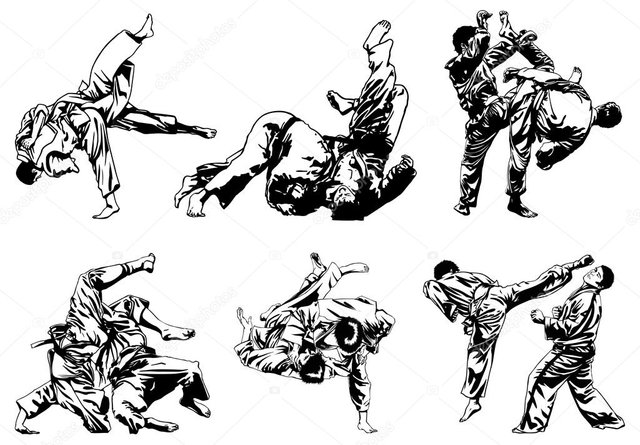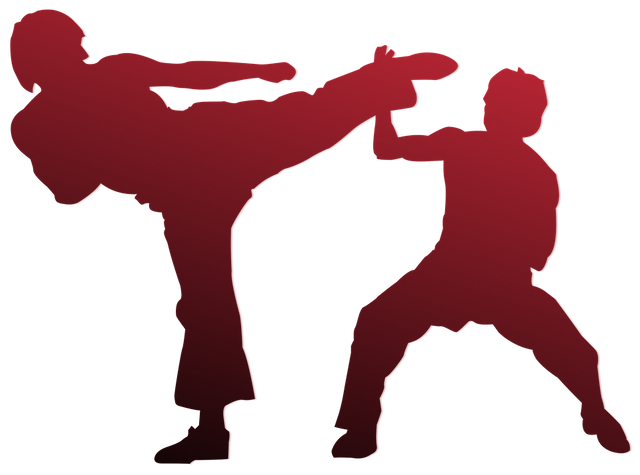Karate vs. Traditional Japanese Martial Arts

When people think of "traditional Japanese martial arts," they usually think of karate. However, karate is not technically Japanese in origin. Karate was developed in the Ryukyu Kingdom, on the Ryukyu Islands, many of which are actually closer to Taiwan than to Japan. The largest of the Ryukyu Islands is Okinawa. The Ryukyu Islands had their own unique language and religion, distinct from Nihongo (the Japanese language) and Shinto (the Japanese religion).
Karate actually traces its lineage back to Chinese martial arts. It is based on Fujian styles of Kung Fu. Its biggest influence is White Crane Kung Fu, which was developed by a female Chinese martial artist named Fang Qīniáng. This is why you see a lot of animal type movements in Karate (e.g. snake hand, chicken head, crane stance). Karate focuses on kata, a choreographed pattern of movement. However, the fancy techniques generally get left out in practical application. Karate takes the form of kickboxing for sparring and competition purposes. Karate involves fancy high kicks and a lot of striking, but not much grappling or throwing.
Traditional Japanese martial arts are quite different. Japanese martial arts comes from the day of the samurai. There are the weapon-based fighting systems, like bojutsu, kenjutsu, and naginatajutsu. The hand-to-hand styles tend to be more like wrestling than kickboxing. Jujutsu is the "old style" Japanese non-weapon fighting style. Jujutsu was specifically designed so that an unarmed person could defend against and attack an armed and armored attacker. Strikes aren't effective if your opponent is wearing metal armor or has a sword. You wouldn't want to punch a metal helmet or try to land a kick when your opponent can easily block it with a sword. Consequently, jujutsu tends to focus more on throws, chokes, joint locks, and immobilizations.
Old style jujutsu developed into two more distinct styles. After the samurai era had ended, Takeda Sokaku developed Daito-Ryu Aiki-jujustu, which incorporates a more offensive approach and uses vital area strikes in conjunction with traditional jujutsu techniques. Kano Jigoro developed Judo, which is a sport adaptation of jujutsu for competitive wrestling. Two of Takeda Sokaku's students developed other distinct forms of jujutsu: Morihei Ueshiba developed Aikido, which was based on his philosophy of non-violence and seeks to subdue the opponent while causing the minimal amount of harm to the attacker, while Choi Yong-sool developed Hapkido, which incorporates much more striking and has a much more offensive approach, seeking to harm the opponent. Judo ultimately developed into what we think of as MMA today. Carlos and Helio Gracie developed Brazilian Jiu-jutsu based on judo. Imi Lichtenfeld developed Krav Maga, influenced mainly by judo, but also incorporating aspects of western wrestling and boxing. Brazilian jiu-jutsu is used in the UFC, whereas Krav Maga is used primarily for self-defense and military/police applications.
very very interesting post in deed @ekkalesiagora
But if some one would aks me ...then i would prefer martial arts over karate ....because i think the former is very very versatile and have wide ways to use...
Thanks for sharing this....steem on & stay blissful...
hey very interesting post!
Wow they are very different but i prefer martial arts so we can use more tools
Exciting history lesson , did not know these particulars. When i was a kid always cheered for kung fu because of the Bruce Lee, he was ny idol )) now i love to watch UFC and see how different styles compete with each other
so interesting to learn about the differences they have i like karate
I thought it was Chinese because I loved watching the Prosley movies.

I think Broesley is the one who made the world know Karate
Nice information, thank you.
Bruce Lee practiced Kung Fu (Wing Chun), although there are a lot of Karate guys in Bruce Lee movies. Bruce Lee developed Jeet Kune Do (JKD), which was aimed at being a more practical/effective adaptation of Kung Fu for self-defense. I think Brazilian Jiu Jutsu and Krav Maga are much more effective though.
Wow...nice post by @ekklesiagora after 19days...
I think this shots is very difficult...
Wel done and smart work..
Upvoted
Cheers~~~
At my childhood i used to think everythings same even kungfu. Lol
different traditions different styles but both have their own prowess :)
I think Krav and BJJ are the most effective. Karate isn't good for fighting or self-defense except in kickboxing tournaments or points competitions.
that's clear, martial arts karate is not very effective
Radical topic shift :)
Waiting to read more on your political thoughts, anyway i have been off for several weeks and it is always nice to read you
I'll probably be posting a few more things on the topic of martial arts soon. Maybe I'll work on something about the intersection of martial arts and political philosophy. I think JKD philosophy fits well with anarchism. Well, maybe BJJ philosophy does too. Definitely think it fits with the scientific epistemology theme. I should be able to tie it in with my other themes.
I am absolutely unfamiliar with martial arts, but waiting to read it. Who knows, maybe I will become interested in MAs all of a sudden